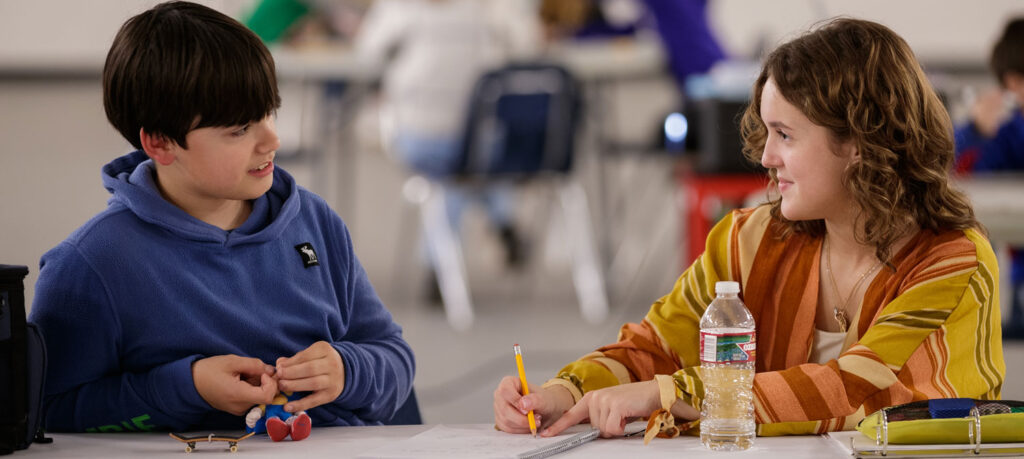

Goals aren’t one size fits all, and neither are the paths to pursue them.
Cities in Schools (CIS) empowers young people to overcome obstacles in their pursuit of education and build new relationships along the way.
“Cities in Schools want to cultivate success stories from each kid,” says Mikinzie Price, CIS executive director. “It is our goal to support each student on their path. Meeting them where they are and letting them know we’re there with you.”
Once an off-site afterschool and summer program, CIS saw a need in its community after the pandemic left gaps in elementary education. The familiar routine and meaningful social interactions most students found in the classroom were missing when in-person schooling was shuttered during the COVID-19 scramble. So, in the fall of 2021, Cities in Schools pivoted to the current service-learning program, a cost-free mentoring program pairing at-risk elementary school children with high school students.
“The overall goal would just be to support kids who don’t have a lot of support or have something missing in their lives,” says John Silver, Plainview Elementary vice principal and CIS liaison. “Whether the students need academic help, or maybe they have a harder home life, or whatever it is, there’s a wide range; we want to come alongside them and connect to them with a role model.”
 Mentors from Plainview High School work with mentees from Plainview Elementary schools to tutor students individually and work with them in group activities.
Mentors from Plainview High School work with mentees from Plainview Elementary schools to tutor students individually and work with them in group activities.Every Tuesday and Thursday, the high school students, fondly called “bigs,” set up their classroom and prepare for their “littles” to arrive. More than 40 high school students participate in the program, sharing a snack with their mentees and working on homework before enjoying a fun activity together — ranging from Dr. Seuss rap battles to constructing towers out of spaghetti noodles.
While the program’s schedule may seem straightforward, the relationships fostered within CIS make it magical. Each elementary student works to improve areas they struggle with, whether it is multiplication tables or making new friends at the lunch table.
The compassionate, driven group of high school mentors showcase the diverse paths young people can take to success. The older students come from a plethora of backgrounds and interests — athletes, artists, “techies” and musicians — all modeling a love for learning and connection-building. Regardless of their chosen career path, graduating mentors are eligible for scholarships awarded by CIS, which can be used to pay for college tuition or tools for technical school. It’s the diversity of the CIS program and the individual assistance it provides young people which makes the program unique.
Each semester students submit surveys to summarize their mentoring experience. Most write fondly of interacting with their mentors, improving their reading and learning new things. One response in particular captured the power of the relationships forged during CIS.
What’s the best thing about mentoring? One elementary student answered, “Playing outside and doing homework and him helping me. He makes me happy when I almost get a little bit angry.”
“The heart of this program is just helping kids, meeting needs and reaching out to those who need” says John Silver, Plainview Elementary vice principal and CIS liaison.
Stacy Newman, the board chairman of Cities in Schools, said the mentoring program is successful because it’s not just focused on academics – but connects teens and youngsters personally.
“If a student is having a bad day and just needs someone to talk to, CIS mentors are available,” she said. “There is still an academic component, but we let the Bigs set the curriculum for that mentoring session. We keep the students between the lines while allowing flexibility with each mentor to determine the direction of the session. The high school mentors have done amazing work and are beginning their path of pay it forward charitable giving.” The mentors work hard to help the younger children, but they learn a lot about responsibility, building relationships and themselves in the process.
“I love hanging out with the kids and always be(ing) able to make them smile…and help(ing) them not worry about anything at least for a little while,” one high school student wrote.
As CIS executive director, Price sees firsthand the difference it makes in the lives of young people. She hears about their improved schoolwork, sees how they make new friends and receives gracious emails from parents writing to say the program gave them back their Thursday evenings to focus on family.
“I think that as a society, we sometimes forget how great challenges can be when you’re little. It is tough navigating a world that you’re trying to figure out. They’re doing that at 7 years old, and we expect them to do it easily,” Price says. “We must be conscious that they’re learning, adapting to so much and overcoming daily challenges. I’m in awe of the littles and bigs. I think each kid’s challenges are individual to them. It may be not having as many school supplies or overcoming a learning disability.”
Helping young people tackle everyday challenges so they can focus on achieving their goals is the core of CIS’ mission. From the widely successful service-learning program, now offered in two local schools, to creating resource rooms for students and staff. Price, her board, the school staff and CIS liaisons are listening to their community to provide for south central Oklahoma’s young people. And such an ambitious mission wouldn’t be possible without support.
 Mentors and mentees from Plainview schools prepare to sing Christmas carols for residents of Southbrook Healthcare.
Mentors and mentees from Plainview schools prepare to sing Christmas carols for residents of Southbrook Healthcare.The Samuel Roberts Noble Foundation has granted CIS more than $500,000 during the last two decades to support the organization’s mission to enhance literacy in a safe, nurturing environment. CIS’ goals go hand-in-hand with the Noble Foundation’s values, which support the Noble Board’s vision to cultivate good health, support education and build stronger communities through philanthropy and charitable grants.
Cities in Schools’ recent pivot to an in-school mentoring program rather than an off-site afterschool program excited the Board, which encourages nonprofits to constantly find new ways to meet the needs of their community. Stacy Newman, who also serves as the Director of Philanthropy for the Noble Foundation, said the foundation supported Cities in Schools’ evolution.
“The foundation was very pleased that Cities in Schools was forward-thinking while coming out of the pandemic and found a path to stay plugged into our community.”
 CIS participants gather at Southbrook Healthcare to carol for residents as part of their community service outreach.
CIS participants gather at Southbrook Healthcare to carol for residents as part of their community service outreach.Newman said the CIS program shift to mentoring came after the Cities in Schools Board of Directors asked how the organization could better serve the community and continue when faced with the pandemic and remote learning challenges. The CIS Board took a leap of faith into an area that, in our community, was missing. Newman said that by turning to mentoring, especially during remote learning, Cities in Schools began to address a much-needed issue in the Ardmore area.
“We felt we could better serve the community by partnering with the local schools,” she said.
While the Noble Foundation has strong ties to the Ardmore area, nonprofits and government subsidiaries inside the U.S. are welcome to submit letters of inquiry through the Foundation’s online grant management system from Jan. 1 through June 30 each year. These letters will be reviewed before the formal distribution of grant applications.
Price is grateful for the Noble Foundation’s continued support of CIS.
“Noble’s support and kindness have just been grounding and stabilizing,” she says. “It encourages us to keep going daily when you have people in your corner like Noble.”
With community support from organizations like Noble, Cities in Schools can continue to provide opportunities for young people.
Perhaps Silver summarized it best.
“The heart of this program is just helping kids, meeting needs and reaching out to those who need.”
 Mentors and mentees play games together.
Mentors and mentees play games together.Stay up to date on all the ways the Noble Foundation is helping address agricultural challenges and supporting causes that cultivate good health, support education and build stronger communities.